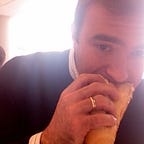When They Come for Ideas
I think it’s worthwhile to pull together two artifacts from the past week, in case anyone can’t see with absolute clarity where the current book-banning mania is headed. The first is Texas Lieutenant Governor Dan Patrick’s tweet from Tuesday that attacked “looney Marxist UT professors” and boasted “We banned [Critical Race Theory] in publicly funded K-12 and we will ban it in publicly funded higher ed.” (NOTE: As I started writing this, Patrick followed up with a press conference in which he vowed to end tenure in Texas universities, and specifically threatened to find ways to revoke tenure for any professor caught teaching “Critical Race Theory.”)
The second is a breathtaking document compiled by members of Moms for Liberty’s Travis County group and shared on their private Facebook page. The document focuses on Eanes ISD, a wealthy suburban district just outside of Austin and the home of Westlake High School. Group members combed through more than 1000 books in the district’s libraries, clearly using Matt Krause’s 850-book list as a base, cataloguing where in the district these books were found and documenting “issues” in each book that could lead to parental objections. Though the list’s compilers say “this is in no way suggesting that the entire list be banned from school libraries,” it was clearly designed with book challenges in mind, as the note attached to the document outlines how the compilers believe many of the books violate Texas law.
In McKinney, outside of Dallas, a couple recently spammed their school district with almost 300 book challenges, claiming to have read all of the books to which they were objecting. The compilers of the Eanes list don’t make that claim, but they do express strong opinions about the books’ content.
The descriptions of the books are, well, wild. It’s clear that LGBTQ stories are per se a problem for these people, and that any description or discussion of sex is too much, even for books found only in high school libraries. The compilers complain that a biography of Sharice Davids, which mentions that she’s gay, was read aloud in an elementary school class “without Parental consent/permission.” They also describe many books in all caps as “EXPLICIT” or “VULGAR” or “PORNOGRAPHY!”
The compilers struggle with notions of genre, complaining about bias in novels and memoirs, and objecting when nonfiction writers include opinions or personal stories in their work. Again, these people are clearly not readers. But that doesn’t stop them from passing literary judgments. “NOTHING redeeming about this book,” they say of Ashley Hope Pérez’s award-winning novel Out of Darkness. “No educational content,” they say of Sherman Alexie’s The Absolutely True Diary of a Part-Time Indian.
But I want to zoom in on this: Of every book on the list that deals with race or racism, they write “CRT — Illegal in Texas!”
Put aside for a second that none of the books on the list (with the arguable exception of Michelle Alexander’s The New Jim Crow) is Critical Race Theory. Ta-Nehisi Coates isn’t a critical race theorist; Ibram X. Kendi isn’t a critical race theorist; Angie Thomas and Jerry Craft certainly aren’t critical race theorists. And put aside the absurdity of describing novels as CRT, which makes as much sense as calling The Grapes of Wrath or Pablo Neruda’s poetry “Marxist theory.” Put that aside, because it doesn’t matter to these people what CRT is or is not.
Instead, let’s look at the claim itself: CRT is illegal in Texas. That’s false, of course. It’s even false if we take it as shorthand for “CRT is illegal in Texas schools.”
In the first place, neither of last years’ laws restricting the teaching of racism in Texas mentions “Critical Race Theory” by name. Rather, both laws forbid a hodgepodge of things that CRT is supposed to do (but really doesn’t): teaching that one race is inherently superior to others, or that white people are inherently racist, sexist, or oppressive, or white people should feel guilt or anguish for being white.
But, just as importantly, even if CRT (or the books they’re calling CRT) did those things, the Texas laws only pertain to what can be taught in K-12 course or teacher training. These laws are bad, but they don’t say anything about what books can or cannot be in Texas school libraries.
In other words, the Eanes list represents an escalation. It’s one thing to say (even misguidedly) we don’t think an idea should be taught in our history curriculum. It’s something else to say the idea is entirely off limits for discussion or consideration by any student in any state school. That’s totalitarian.
Which brings us back to Dan Patrick’s tweet. Another escalation. Patrick’s assault on academic freedom in universities, like the M4L list, shows that the stakes here go way beyond curriculum. This push from the right is about removing ideas from the culture altogether — not through discussion, debate and inquiry, but by government decree.
Frustratingly, even those who understand the stakes don’t quite grasp the risk. UT law professor Steve Vladeck responded to Patrick’s initial tweet by saying, “I still have hope that calmer minds will prevail and will realize it’s everyone’s interest to preserve the principle of academic freedom at the university that bears the state’s name.”
Hope is great, but I don’t see any reason to think calmer heads will prevail. That’s not how things are going right now.
…
I’m attaching here screenshots of Moms for Liberty’s Eanes ISD list.
